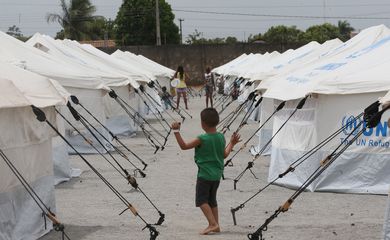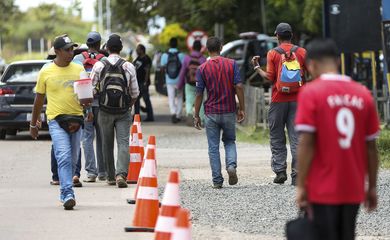Action by UN agencies seeks to empower Venezuelan refugees

A mission to Roraima made up of representatives of UN Women, the United Nations Population Fund (UNFPA) and the UN Agency for Refugees (UNHCR), accompanied by the ambassador of the Grand Duchy of Luxembourg in Brazil, Carlo Krieger, will mark, this Monday (29), the beginning of the work of the Joint Program for Economic Empowerment of Refugee and Migrant Women in Brazil. The visit to the northern state of the country runs until December 1st.

The program is financed by the Luxembourg government and is being implemented by the three UN agencies. Although the visit of representatives and the ambassador marks the beginning of the project, the program began in September and runs until December 2023, prioritizing the socioeconomic integration of refugee and migrant women from Venezuela.
According to UN Women's advisory, the general objective of the program is to ensure that policies and strategies of companies and public and private institutions strengthen economic rights and development opportunities for Venezuelan refugees and migrants. To achieve this goal, the initiative is carried out on three fronts.
The first works with companies, institutions and governments on themes and actions related to decent work, social protection and entrepreneurship. The second addresses refugee and migrant women, so that they have access to training and opportunities to participate in decision-making processes related to the labor market and entrepreneurship. And the third front works with refugees and migrants so that they have knowledge and access to services to respond to gender-based violence.
Expected results
Among the results, the program hopes that more private sector companies will offer training and employment opportunities for Venezuelan women and that initiatives for the socioeconomic integration of refugees and migrants in Brazil will be more sensitive to gender issues - not just in the states where the program will have actions, but nationwide.
“Venezuelan refugees and migrants often face multiple forms of discrimination directed at them as women, related to their ethnicity, social and economic status, language, etc. Our program aims to support the socioeconomic integration of these women so that they have equal opportunities and access to decision-making, employability, healthcare, education and other services in Brazil”, said the representative of UN Women in Brazil, Anastasia Divinskaya.
According to the UNFPA representative in Brazil, Astrid Bant, the program is important because the fight against gender-based violence is one of the pillars of the United Nations Population Fund in humanitarian assistance. "In order for refugee and migrant women to achieve financial independence, the elimination of violence is an important condition," she said.
An important part of the actions that will be carried out through the program will start from the interiorization process – when Venezuelans and Venezuelans are voluntarily taken from Roraima to other states in Brazil. According to official sources, there are more than 62 thousand people interiorized.
“Hundreds of thousands of Venezuelan refugees and migrants seek protection and livelihoods in Brazil. The pandemic brought even deeper challenges to this population,” said José Egas, UNHCR representative in Brazil. According to Egas, the Luxembourg government was one of the first to “reach out” in the emergency response to Venezuela.
The Luxembourg government said that, among the priorities of international cooperation with UN agencies, is continuing to support actions for the economic empowerment of women and for responding to the migratory flow in Brazil. . “We are happy to support, listen and know that we can work together on this response. We encourage the work of the three agencies, under the leadership of UN Women,” said Ambassador Carlos Krieger.
Text translated using artificial intelligence.








